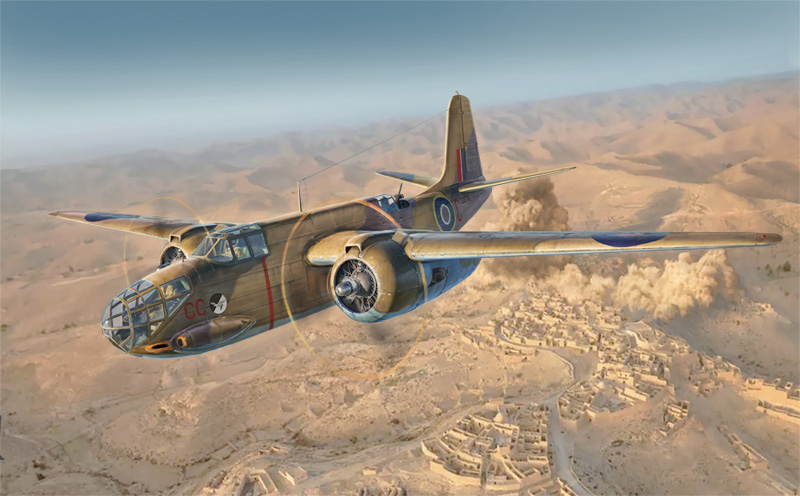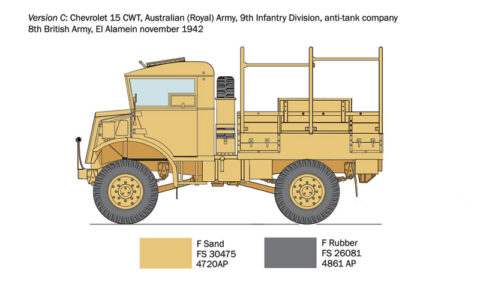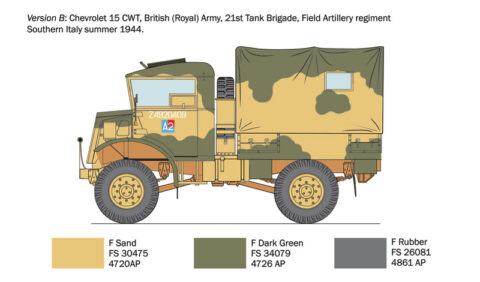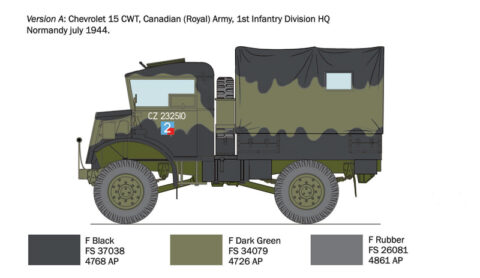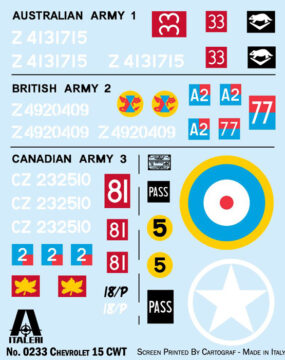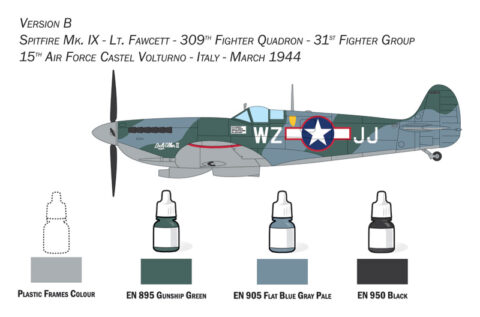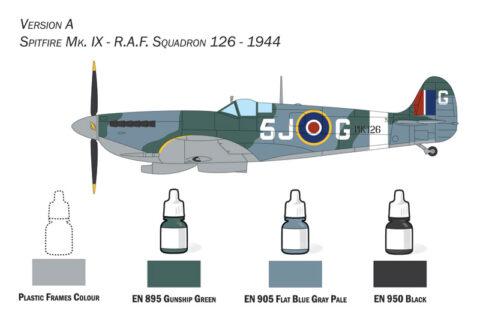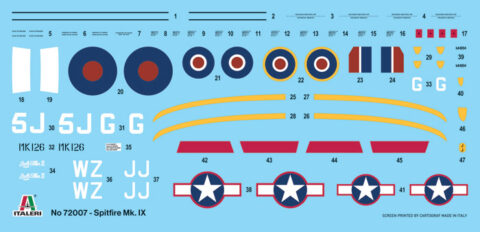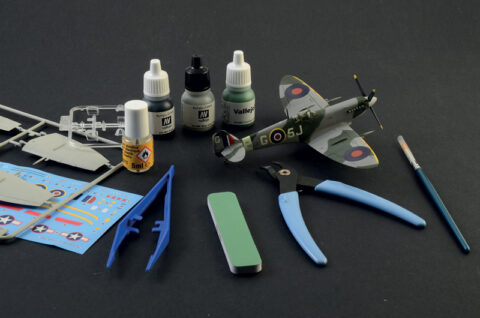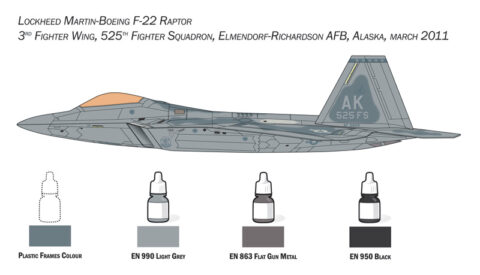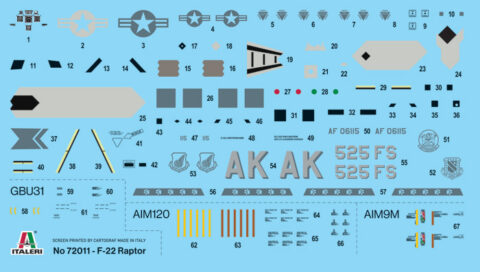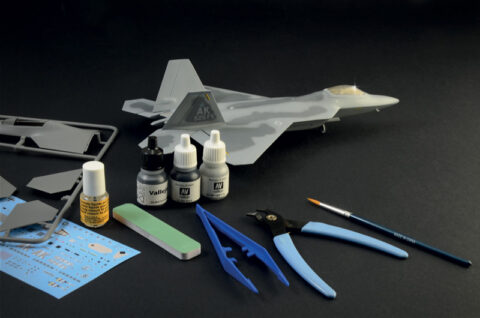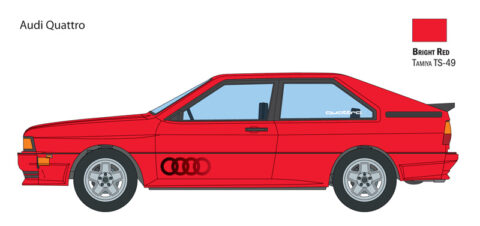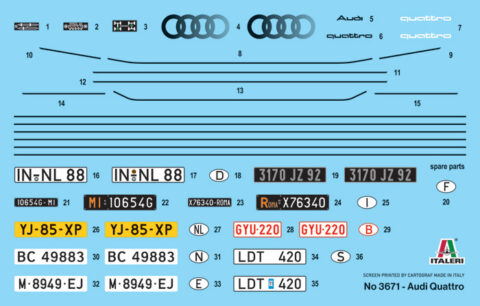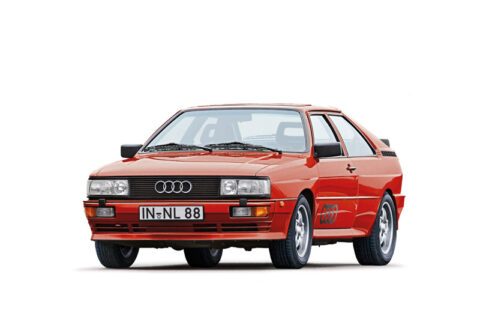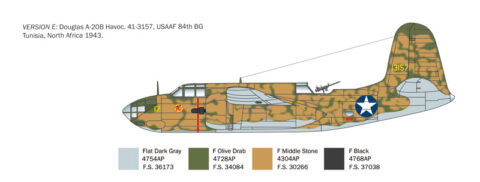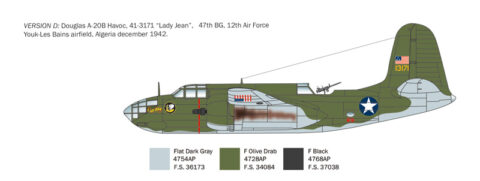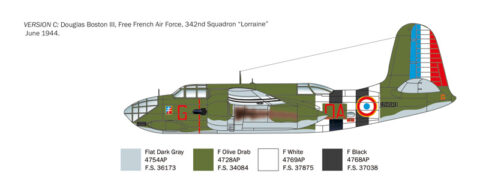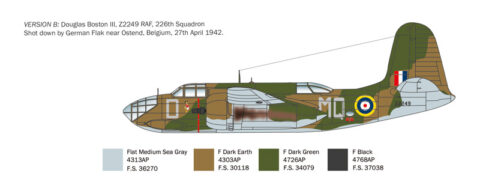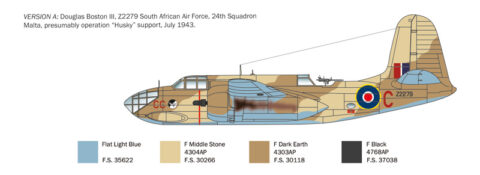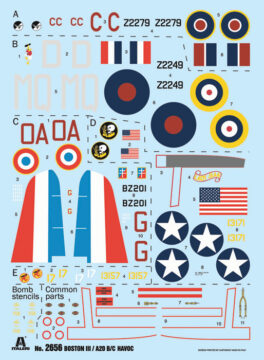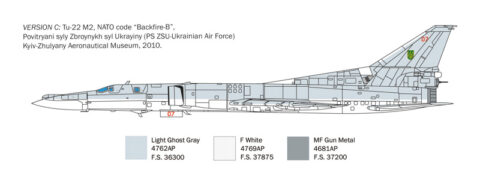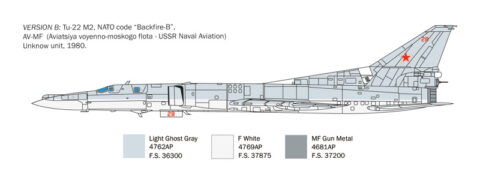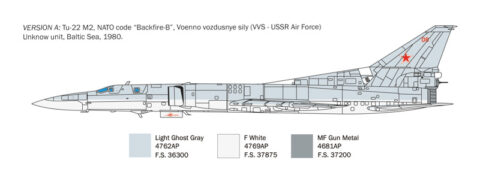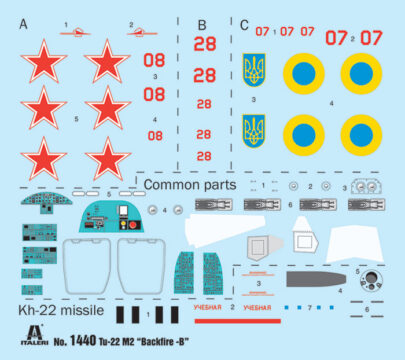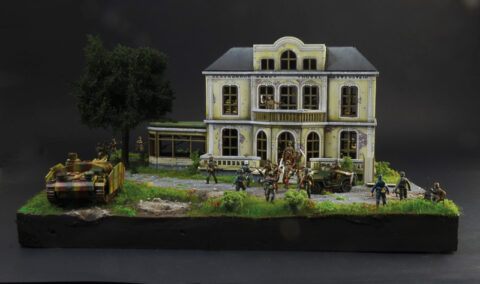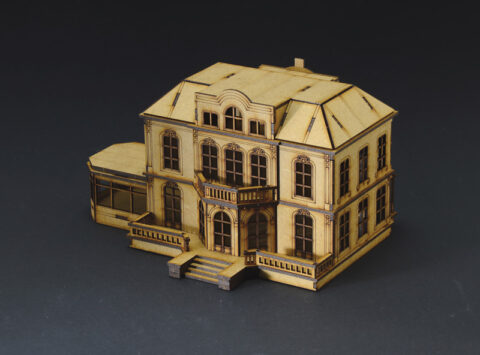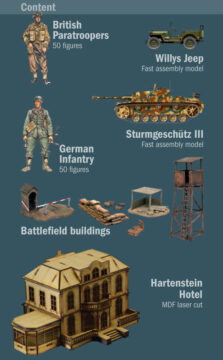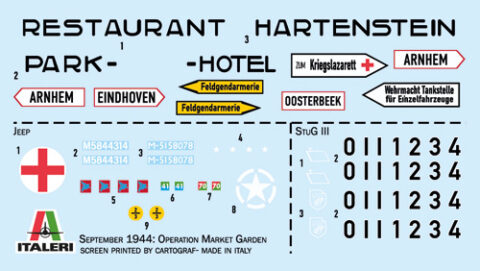Industry News
Italeri News Aug 2024
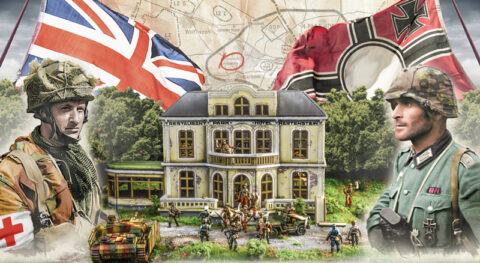
1/72 Hartenstein Hotel 1944 Market/Garden – BATTLE SET
After the Normandy landings in June 1944, the Allies planned the invasion of German territory in order to end the war as quickly as possible. Operation “Market Garden,” devised by Bernard Montgomery, entailed bypassing German defenses through the use of British, American, and Polish airborne troops. The paratroopers were tasked with seizing control of bridges in the Netherlands, between Eindhoven and Arnhem, to secure the Allied forces’ access routes into Germany. However, strong German resistance and the Allies’ failure to cross the Rhine compromised the operation, resulting in its failure. The war was prolonged, requiring several more months of fighting before the Allies entered Germany. Hartenstein, during Operation Market Garden, served as the focal point of activities and was utilized as the headquarters for the British 1st Airborne Division.
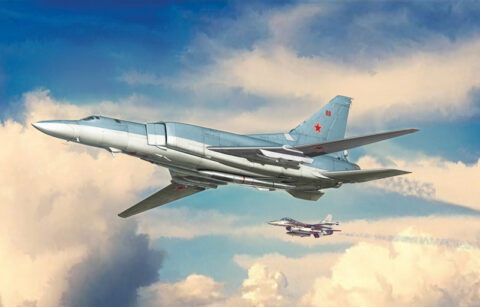
1/72 Tu-22M2 Backfire-B
ORIGINAL MOULDS FROM ESCI – NEW SUPER DECALS FOR 3 VERSIONS – COLORS INSTRUCTION SHEET
CONTAINS 1 MODEL
Developed in the late 1960s, the Tupolev TU-22M “Backfire” entered service with the Soviet Air Force during the 1970s and can be considered, due to its distinctive design, an icon of the Cold War. The “Backfire” is a twin-engine strategic bomber with variable-geometry wings capable of carrying and deploying both nuclear and conventional weapons. An advanced aircraft for its time, it represented a significant improvement over previous Soviet strategic bombers. Thanks to its two powerful engines mounted under the tail, the Tupolev bomber could reach speeds of Mach 1.9, posing a formidable threat to U.S. and NATO air defenses. The “Backfire” was also specialized in conventional attacks against surface ships. With the dissolution of the Soviet Union, a large number of TU-22Ms were utilized by the Russian Air Force, with subsequent upgrades in avionics and propulsion systems.
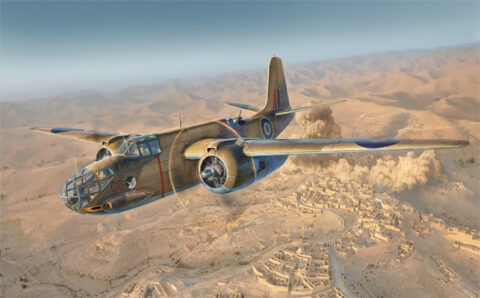
1/48 BOSTON III A – 20 B /C Havoc
NEW DECAL EDITION – SUPER DECALS SHEET FOR 5 VERSIONS – COLORS INSTRUCTION SHEET
FIGURE NOT INCLUDED
The twin-engine Douglas A-20 was developed by the American company to perform two main operational roles. Its airframe, featuring the distinctive mid/high-mounted cantilever wing, could be configured as a night fighter and attack aircraft by adopting a powerful weapon system in the forward nose section, or configured as a light bomber. The light bomber version achieved significant success not only with the U.S.A.F. but also with the British RAF, which renamed the Douglas aircraft “Boston.” The nose of the Boston was glazed to accommodate the bombardier but retained the nosewheel tricycle landing gear, innovative for its time. It could carry up to 1,800 kg of offensive payload and was produced in large numbers, being employed by the RAF, various Commonwealth air forces, and some units of the Soviet Air Forces.
1/24 Audi Quattro
COLOR INSTRUCTION SHEET
In 1980, during the Geneva Motor Show, the German car manufacturer from Ingolstadt presented its new two-door coupé, the Audi Quattro. Produced throughout the 1980s, its Italian name highlights its main feature: four-wheel drive. At the time, four-wheel drive on a vehicle aimed at generating high sales figures was indeed an important innovation. The “Quattro” guaranteed good performance combined with excellent road holding on any type of surface. The longitudinal front engine was capable of delivering appreciable performance. A competition version was also created, which debuted in the World Rally Championship in 1981, achieving good results. The success of the “Quattro” continues to this day, so much so that the Italian name has become a true “brand” that identifies the entire latest range of Audi’s four-wheel-drive cars.
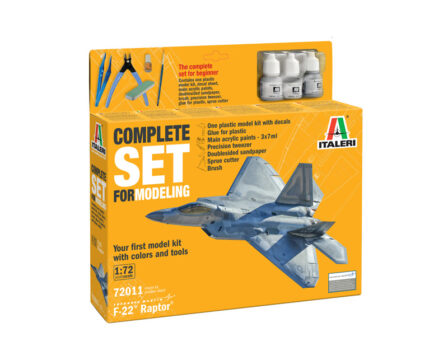
1/72 F-22 Raptor
The complete starter kit for beginner
Contains: One plastic model kit with decals – Glue for plastic – Main 3 acrylic paints ( 7ml ) – Brush – Precision tweezer – Doublesided sandpaper – Sprue cutter
The Lockheed Martin-Boeing F-22 is a 5th generation USAF stealth fighter aircraft. Extremely innovative in concept and design, the “Raptor” is equipped with two Pratt & Whitney F119 turbofan engines, with afterburners capable of generating vector thrust via its exhaust nozzles. The “stealth” capability is provided through the aerodynamic profile and the use of “hi-tech” materials capable of minimizing radar detectability. Evasion capability is further aided by detailed design engineering of the air intakes and exhausts to reduce heat generation from exhaust gases and also noise emission reduction. The air-to-air and air-to-surface armament systems are installed in loading bays within the fuselage in order to further minimize radar detection. The aircraft avionics are extremely advanced and able to detect, track and acquire targets even at long range.
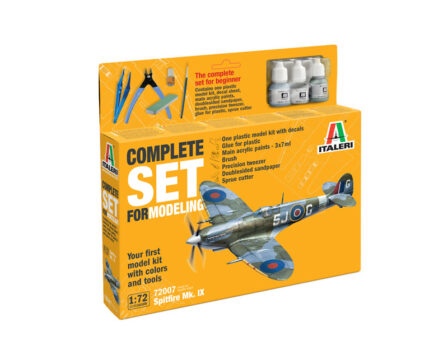
1/72 Spitfire Mk. IX
The complete starter kit for beginner
Contains: One plastic model kit with decals – Glue for plastic – Main 3 acrylic paints ( 7ml ) – Brush – Precision tweezer – Doublesided sandpaper – Sprue cutter
The Supermarine Spitfire is considered to be one of the most famous fighter aircraft in aviation history and an “icon” of British aeronautical production. The well-armed low-wing single-engine aircraft along with the Hawker Hurricane, formed the backbone of the Royal Air Force fighter units engaged against the German Luftwaffe during The Battle of Britain. The Spitfire’s success in the Battle helped to cement its status as an iconic aircraft. It was celebrated for its elliptical wing design and powerful Rolls-Royce Merlin engine. During the war, in response to the technological innovations of the Luftwaffe that led to the development of the formidable Focke-Wulf Fw 190, the Spitfire itself was constantly evolved in its aerodynamic configuration and engine. The Spitfire Mk IX version was able to compete on equal terms with the most advanced German fighters of the period and was produced in sufficient numbers to meet operational needs.
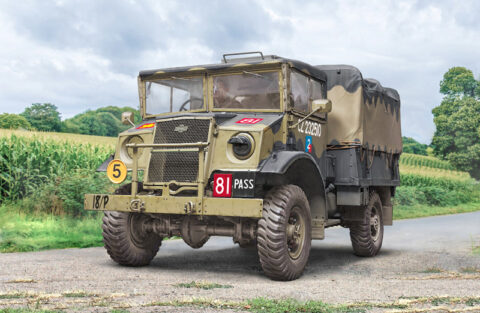
1/35 Chevrolet 15 CWT
NEW DECALS SHEET FOR 3 VERSIONS – COLORS INSTRUCTION SHEET
Throughout the 1930s, a series of production agreements were established for the manufacture, by the Canadian subsidiaries of major American automobile manufacturers, of a line of trucks designed to meet the transport needs of British troops and the principal countries of the Commonwealth. Production was significantly increased during World War II, and the “Canadian Military Pattern (CMP) trucks” accompanied Commonwealth troops on major European fronts, from the North African campaign, to the invasion of Sicily, to the Normandy landing. Robust, reliable, and particularly effective in operational use, they were produced in numerous configurations and with various roles, from military logistics to artillery towing. The CWT 15 version, with four-wheel drive and good load capacity, was particularly appreciated.
HobbyLink International
eBay Store

